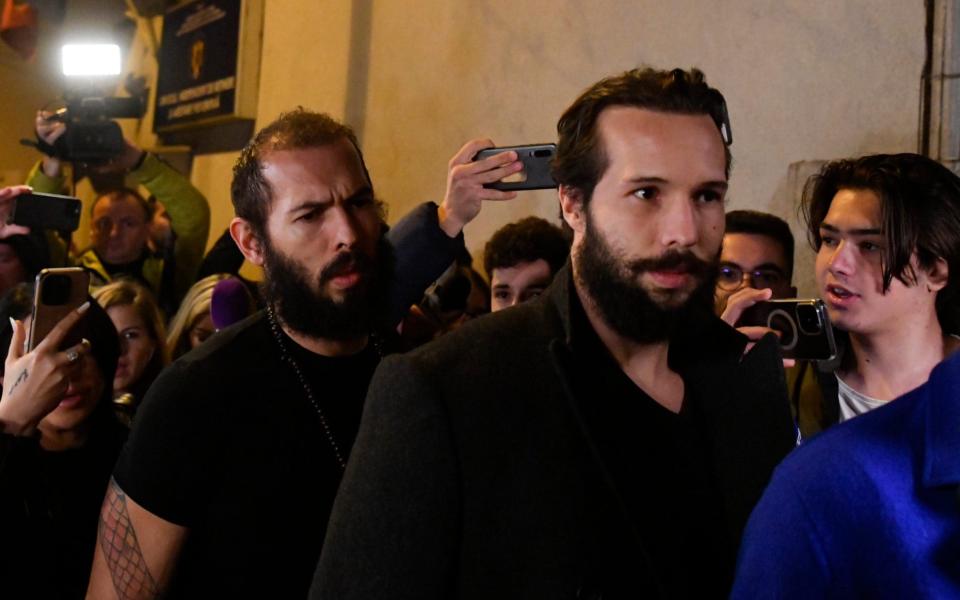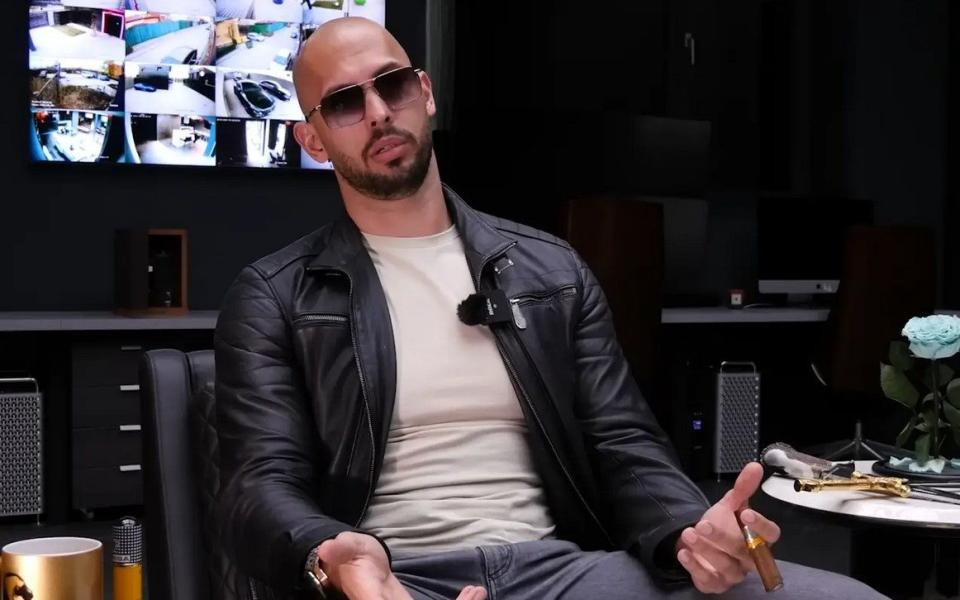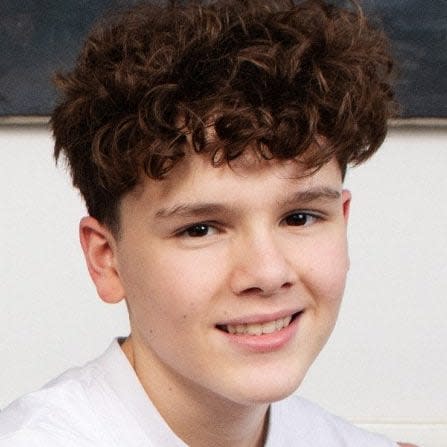What my teenage sons really think of Andrew Tate’s toxic masculinity

On a family drive to the coast last summer, we listened to a podcast interview with Andrew Tate – self-proclaimed poster boy for “toxic masculinity”. The hosts, a husband and wife, were making fun of him, but he was oblivious. He ordered the woman to bring him two coffees while stating that he didn’t intend to drink them. He merely wished to establish her subservience.
For 20 minutes, my three teenage sons found his outrageousness funny. But they don’t admire misogyny. They thought him a clown and an idiot, and were laughing at him. (This was before Tate was arrested on allegations of rape and human trafficking with his brother, Tristan, last December, in Romania. The pair, with two accomplices, were remanded in prison initially, and are now currently under house arrest as investigations continue.)
Now, when I mention Tate to Conrad, 18, he shakes his head, and says: “He’s very insecure. I don’t think his father was very good.”
My sons have been luckier. They’ve had plenty of wonderful men in their lives: their grandfather (gentle, kind, DIY whizz) and our friends. One (high-flying, adrenaline sports fan) – wrote my husband the most beautiful poem for his 50th. “I love his soft side,” said Oscar, now 20. Despite the challenges of adolescence, they don’t need Tate, because they have warm, authentic relationships. They’re not lonely, sad or disaffected.
But many young men are. It’s why Mike Nicholson, a former English teacher, developed The Progressive Masculinity Program. The course, a series of workshops for boys aged 10 to 18, challenges narrow stereotypes of masculinity and gives boys the freedom to redefine it – and, in so doing, to raise their self-esteem, emotional intelligence, articulacy and aspirations.
“What comes across loud and clear, working with different social classes up and down the country is that boys feel unseen, unheard, marginalised,” he says. “It’s given rise to a lot of frustration and anger, and people like Andrew Tate are quite happy to fill the void with their destructive ideology of masculinity.”
A British-American former kickboxer, Tate, 36, has gained notoriety online in recent years for promoting a so-called hyper-masculine, ultra-luxurious lifestyle and for controversial comments, including the claim that women should “bear some responsibility” for being sexually assaulted (one of a number of statements that led to him being banned from Twitter).
Nicholson, 41, who taught in secondary schools for nearly 20 years, informally mentored boys, particularly those with social or emotional problems. “Their issues boil down to the same thing,” he told the headteacher. “This performance of masculinity that they feel so under pressure to live – it’s sabotaging their academics, their relationships, their mental health.”
These boys aren’t bad. They’re miserable. “They’re suffering. Happy lads don’t flip over their desks and tell the teacher to f--- off. They don’t call girls slags and sluts.”
Over three years, it led him to create The Progressive Masculinity Program. It’s been so well-received in schools, like rainwater in a desert, that a year ago he quit his job to pursue it full-time.
Over my 20 years of parenting, I’ve seen the hostility. A girl’s father, snarling “Get out the way” when my eldest son was two, fumblingly negotiating the playground slide. The female teacher who bullied my confident middle son, then nine, until he was so anxious he couldn’t eat, then sneered at him for “crying” to his mother. The elderly woman who hit my youngest son’s legs with her stick as he waited for the bus. Often, boys aren’t treated as children. They’re treated as predators.
The PM course – six hours, usually delivered over two days, in school – explores what being a man means, the social and cultural influences that shape our understanding of masculinity and the importance of communication and how it can bring progress and cooperation. It also teaches emotional self-regulation; how to develop strategies to understand your anger and manage it, as well as encouraging participants to reflect on their aspirations and role models, their attitudes to other groups, and social cohesion (and how it relies upon empathy and cooperation).
“The very first thing we do is to ask the boys to create the unwritten rules of being a man,” says Nicholson. There’s no judgment so they feel safe being honest. It’s the same, whether he’s in a grammar school in Cheshire, or an alternative provision in Salford. “Never look weak, always look strong, attract lots of girls, play contact sports like football and boxing, materialism – have the latest brands.”
The traditional narrative of masculinity, says Nicholson, is of exclusion. “You’re too skinny, you’re too fat. You’re in a wheelchair, you’ve got autism.” The “Guy Code” only allows a narrow group to call themselves men. The rest, “live in the cold and the dark on the outside, or live a performance, pretending we’re something we’re not”.

Nicholson aims “to help boys find the strength to end the performance, and choose the man that they want to be”. Often, desperate to know how to become “real men”, boys piece together a Frankenstein’s monster of ideas on masculinity from film, social media, friends, and act it out. Nicholson explores these messages. “What’s consistent is dominance, aggression, violence, law of the jungle,” he says.
It poisons boys’ lives. Recently, my husband and I found a terrified-looking boy outside our house in north-west London. He’d been chased by three older boys, who’d kicked his takeaway to the ground. Normal. All my sons have been mugged, and half the work is convincing a 13-year-old that when there’s a knife shoved in his face, it’s not unmanly or shameful to hand over his phone or run.
As for the terrified boy, my husband walked him home, helped him calm his breathing, made him laugh. It turned out he was the brother of a friend of our son Caspar, 16. “When I told him it was my Dad who helped his brother, he gave me a hug,” said Caspar. The antidote to toxic masculinity is leading by example. It’s why my admiration for Nicholson, a down-to-earth Mancunian (who, incidentally, lets his five-year old son play with toy guns) couldn’t be greater.
Partly thanks to the social deprivation of lockdown, he sees 15-year-old boys with an emotional age of 11 or 12. “Quite worrying really. They’re almost ready to go out into the big world, and they’re so young.” The parroted advice is “talk to someone” if you’re struggling, but he says: “The boys don’t have the vocabulary. They’ve never seen an emotionally open, vulnerable conversation between men.”
Even though as parents we’ve tried to make it easy for our boys to share their fears and worries, they haven’t always felt able to do so. Social conditioning and character might be part of it, but I am sure my own anxieties have at times dissuaded them from confiding in me.
Nicholson tells me that the best thing I can do for my sons is to create a safe, non-judgmental environment. “If you make them feel safe, lads love to talk.” He models how he might approach speaking to a friend about his mental health. Then the boys role-play “having to reach out, because of some emotional or social issue”. Afterwards, they are asked: “How did you manage to communicate? What words did you use? Would that have led to a satisfactory outcome?” It gives boys a template.
People are amazed, telling him: “Lads don’t like to show emotion, and you make them do it.” No mystery – they know they won’t be mocked. “At the start, they’re cagey, they think maybe they’re being punished,” he says. “By the third workshop, you can’t shut them up. They’re like, ‘Oh my god, this is what it’s like!’”

At home, we too can help our boys by not shaming them. He understands why parents might become angry if their son repeats something abhorrent. But however disturbing an attitude, says Nicholson, better out than in, because then we can challenge it in a non-shaming, healthy way.
“If I use one of Andrew Tate’s lines – ‘women who are raped have to bear some responsibility’,” he says, “it’s an absolutely horrifying thing to hear, and if my son said that, my natural reaction would be to lose my head. But all the boy learns in that situation is that it’s not safe to be honest. And now he can’t be guided, he can’t be challenged.” Nicholson adds:, “I present a counter-argument so they develop empathy for the other side. I show the real-world harm. Put a name and story on it. That has a much more powerful impact than saying, ‘That’s disgusting! Never say that again!’ which doesn’t change the attitude.”
He asks boys what kind of partner and father they want to be (“What they say is beautiful”), and they reflect on what decisions one might make to become that man. He populates the workshop with real-life examples of men who are strong and caring, successful and selfless. He shows boys that “you don’t have to choose – you can be both”. And crucially, Nicholson aims to build mutual support and understanding between the sexes.
In his workshops, he helps boys understand “how difficult it is to be a girl or a woman, to develop that empathy”. And in his year group assemblies, female students glimpse a world that boys usually hide, afraid of looking weak or vulnerable. Girls tell Nicholson: “We had no idea it was like this for boys. We thought it was easy to be a lad.”
It isn’t, but Nicholson is making it easier.
The last thing he does is to ask boys to re-write the Guy Code, applying what they’ve learned. He is unshackling our boys from ugly misconceptions about masculinity that make them unhappy, and showing them they have the strength, and freedom to be the good men they want to be.
What it’s like to be a 16-year-old boy today
Caspar Robinson

The common rules about being a man are: don’t be vulnerable, assert dominance – you’ve got to be the apex predator. I don’t really bother too much. I do what I enjoy, such as going to the gym and trying to do well academically. I’ve also become very aware of the bigotry online towards minorities, religions and genders. Anti-Semitism is pretty rampant. The evil towards people who aren’t you. It’s upsetting.
I try to stand up against unfair stereotypes and hatred. My role models are my parents. A lot of the boys who buy into Andrew Tate’s harmful messaging are abusive, mentally and physically – they’re toxic. I’ve never met a really happy person who inflicts harm on someone.
People are horrid to others because they’re upset about who they are or who they want to be. They clearly aren’t paid attention to. Often there’s neglect or social deprivation. Or their parents aren’t there guiding them. Their way of coping with that is hurting others. It’s a very straightforward pattern.

 Yahoo News
Yahoo News 
